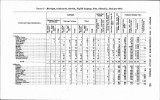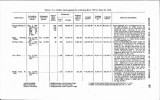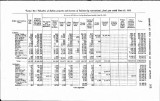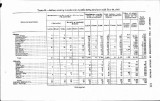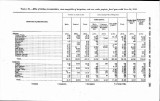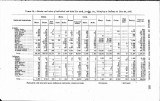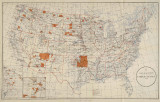| OCR Text |
Show council. A suit was instituted against the Secretary of the Interior by one of the deposed councilmen is. the Supreme Court of the Dis-trict of Columbia, questioning the right of the Secretary to remove him. The court rendered a decision in which the action of the Secre-tary was upheld, and that decision was a h e d on appeal to the court of appeals. After the dismissal of the tribal council, a special election was held on January 22, 1913, which resulted in practically the unanimous election of new tribal officials. The bids rejected by the old council were reconsidered by the new council, the highest accepted, and the principal chief authorized to execute leases to the successful bidders. The regulations of July 3, 1912, prohibited pipe-lime companies from bidding. Some of the best bids received on November 11,1912, , were made by the Gypsy Oil Co. On account of its close afliliation with the Gulf Pipe Line Co., the department held that the Gypsy Oil Co. was not eligible and refused to approve leases executed in its favor by the principal chief of theOsage Tribe. Eight leases in favor of parties shorn conclusively not to he interested in pipe-line trans-portation, covering 24,561 acres, were approved by the department in the early part of March, 1913. On January 9, 1913, the regulations were amended so as to permit leases and assignments to be approved to pipe-lme companies pro-vided that no right, claims, or equities as against future action by or under authority of Congress respecting oil or gas pipe line companies should be predicated upon such approval. INHERITANCE CASES. The act of June 25,1910 (36 Stat. L., 855, 856), devolved upon the Secretary of the Interior the duty of determining the heirs of deceased Indians, but failed to make an appropriation to carry out this work. As already said, there are approximately 40,000 Indian heirship cases pendingat the various agencies,representing inheritedproperty,valued atmore than $60,000,000, which can not be soldorotherwisedisposed of until the heirs are determined. The adjudication of these cases is one of the most important duties confronting the Indian Service. This work has been greatly handicapped by the lack of appropriation and, consequently, by lack of a sufficient number of employees to handle it. The Indian appropriation act for the fiscal year 1914 has partially removed this impediment by an appropriation of 550,000. There is a provision that upon the determination by the Secretary of the Interior of the heirs of a deceased Indian, the sum of $15 from the proceeds of the estate shall be paid into the Treasury, to cover the cost of determining the heirs. During the year over 10,000 cases have been received pertain-ing to heirship matters. This includes not only oases where the |






























































